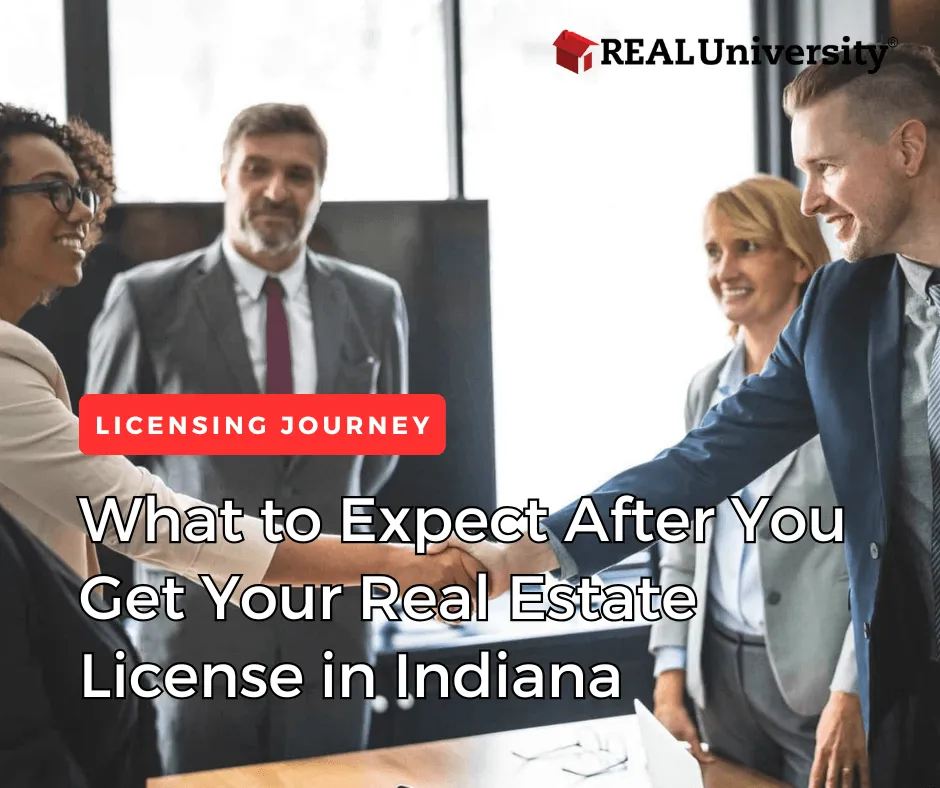What to Expect After You Get Your
Real Estate License in Indiana

You did it— you passed the exam, met all the requirements, and officially received your Indiana real estate license. So… now what?
Getting licensed is a huge milestone, but it’s just the beginning of your journey. The first year after licensure is a critical time when you lay the foundation for your future success as a real estate professional. From completing mandatory post-licensing education to choosing a brokerage, there are still a few essential steps ahead.
In this guide, we’ll walk you through exactly what to expect after you get licensed in Indiana—plus share helpful links to earlier parts of the journey, including:
🧑💼 Step 1: Activate Your License Through a Managing Broker
Getting your license doesn’t automatically make you a practicing agent—you’ll need to affiliate with a managing broker to begin working legally.
What to consider when choosing a brokerage:
Training and mentorship opportunities
Office culture and team structure
Commission splits and fees
Marketing and technology support
This is one of the most important decisions you'll make early in your career. Interview multiple brokerages to find the right fit for your goals and personality.
📚 Step 2: Complete Your 30-Hour Post-Licensing Requirement
Once you're affiliated with a broker, the clock starts ticking: Indiana requires new agents to complete 30 hours of post-licensing education within one year of receiving their license.
Unlike pre-licensing, which prepares you for the exam, post-licensing helps you develop the practical skills you'll need in the real world—like working with clients, writing offers, and navigating closings.
Need a refresher on how this fits into the bigger picture? Check out:
📈 Step 3: Build Your Client Base and Marketing Presence
Once your license is active and you’re legally allowed to practice, the real work begins—generating leads and closing deals.
Essential marketing steps for new agents:
Build a professional website or landing page
Set up social media business profiles (Facebook, Instagram, LinkedIn)
Create a CRM (Customer Relationship Management) system to track contacts
Order business cards, signs, and branded materials
Most new agents rely heavily on their personal network at first. Don’t be shy—let people know you’re now a licensed agent and ready to help!
📞 Step 4: Start Prospecting and Working with Clients
Prospecting means reaching out to potential buyers, sellers, or renters—and it’s one of the most important daily habits for success in real estate.
As a new agent, expect to spend a lot of time doing the following:
Hosting open houses
Calling or texting leads
Door-knocking (if allowed in your area)
Attending local networking events
Following up consistently
You’ll also begin learning the rhythm of real estate transactions: listing appointments, buyer consultations, showings, inspections, offers, and closings.
🏫 Step 5: Continue Your Learning and Growth
Education doesn’t stop once you’re licensed—it evolves. You’re now in the “learning by doing” phase, where real experience meets foundational knowledge.
To prepare, we always recommend that agents begin their journey with a solid pre-licensing foundation. If you’re just starting to explore this path, start here:
👉 How to Get Your Real Estate License in Indiana: Step-by-Step Guide
👉 What to Expect in a Pre-Licensing Course at REAL University
And if you're past that stage—congratulations! Your next priority is finding ways to grow your knowledge in areas like:
Negotiation skills
Market data analysis
Legal contracts and disclosures
Customer relationship building
Local trends and neighborhood insights
🧾 Step 6: Understand Your Continuing Education Requirements
Even after you complete your post-licensing course, you’ll be required to complete 12 hours of continuing education (CE) each year to keep your license active in Indiana.
Staying up-to-date with CE is not only a legal requirement, but also a great way to stay current with trends and updates in the market.
Keep track of your education dates and requirements to ensure you never fall out of compliance.
👥 Step 7: Join Industry Associations and Build Your Network
New agents should strongly consider joining:
Membership gives you access to the MLS (Multiple Listing Service), legal resources, networking events, and ongoing education—all critical tools for growing your business.
Additionally, start developing relationships with:
Mortgage lenders
Title companies
Inspectors
Appraisers
These connections will help you better serve your clients and close transactions smoothly.
📌 Bonus: Set Realistic Expectations for Year One
The first year in real estate is exciting—but also full of challenges. Here's what many agents experience:
✅ Wins:
Learning on the job
Growing confidence
Building your brand
Making your first sales
❌ Challenges:
Inconsistent income
Client rejection
Self-motivation struggles
Long hours, especially evenings and weekends
The key is persistence. Stay committed, keep learning, and lean on your brokerage or mentors for support.
🚀 Final Thoughts
Becoming a licensed real estate agent in Indiana is a big deal—but your real journey begins after that license is issued. From activating your license and completing post-licensing education to finding clients and growing your business, there's so much opportunity ahead.
REAL University is here to help you every step of the way—whether you’re at the beginning stages (check out How to Get Your Real Estate License in Indiana) or ready to thrive post-licensure.
Stay informed. Stay consistent. And don’t forget—you’ve got this! 🙌
